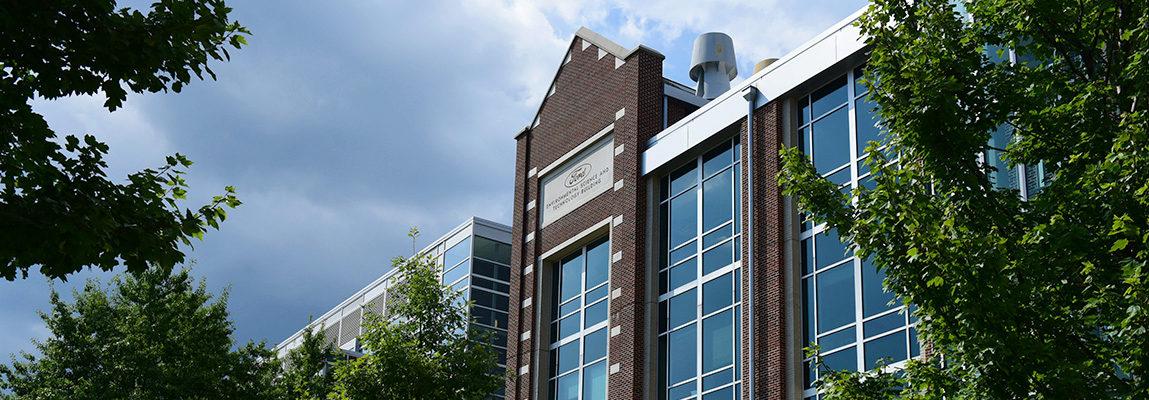
GT ChBE is continually looking for ways to improve the education and training that we give our graduate students. Discussions with many stakeholders in the GT ChBE community have indicated that one of the things that would be most valuable for our graduates is training in the "soft," non-technical skills that are so vital to navigating the workforce. Recruiters and employers of GT ChBE students want their recruits to have more of these skills, and previous PhD alumni of GT ChBE have expressed that they wish that they had been given more training in these skills to help them hit the ground running in their new jobs. These include things like project management, leadership, giving effective presentations, communicating effectively via writing, and other non-technical skills.
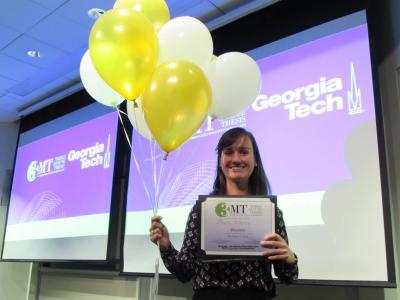
Learn to give effective technical presentations like this past Three-Minute Thesis Competition winner.
Accordingly, the ChBE faculty worked with AChEGS to establish a program that would help to provide more formalized training in these areas without placing undue time burdens on students. Our goals were to make the training accessible, relevant, and not duplicative of opportunities already available on campus.
Starting in 2018, GT ChBE adopted a “Professional Preparation” requirement for all entering PhD students. Over the course of their four or more years here, students will be required to complete at least 10 “Professional Preparation Units” (PPU) via workshops that are designed to give both training and the opportunity to practice these “soft," non-technical skills to prepare them for their future professional endeavors. One PPU is roughly equal to one hour of in-class training time, and students must participate in at least three different PPU-granting activities. This structure was designed to give students optimal flexibility in what kinds of professional preparation they get and when they get this training, potentially allowing for just-in-time training on, for example, project management or team leadership just before taking on undergraduate researcher mentees.
The ChBE Graduate Handbook states:
“Candidates for the PhD degree must complete at least 10 Professional Preparation Units by attending at least 3 Professional Preparation Activities during their time in the School. Professional Preparation Activities are workshop and courses designed to provide training and experience in skills that may not be an explicit focus of candidates’ academic research but are critical for professional success beyond the PhD. A selection of workshops or courses will be offered every year, with an announcement to all graduate students sent at the beginning of the fall semester listing the expected offerings for that academic year and the number of Professional Preparation Units fulfilled by each respective offering. All required Professional Preparation Units must be completed before the Thesis Defense; students are encouraged to complete most before their Pre-Doctoral Review meeting. If students participate in Professional Preparation-related workshops or courses in other Units of the Institute, they may petition to have those efforts count toward their required Professional Preparation Units.”
The ChBE Graduate Office and the PhD Careers Committee are pleased to announce the following workshops for the rest of the Fall 2025 semester. We encourage you to take advantage of these opportunities not only to fulfill the PPU requirement, but also to develop your non-technical skills and better position yourself for future success.
Registration LinK: https://forms.office.com/r/qhyyE1XePb
1. AChEGS - Enhancing Your Effectiveness as a Mentor
Speaker: Stacey Doremus
Date: Thursday, October 9, 2025
Time: 4:00 p.m. to 5:00 p.m.
Venue: EBB CHOA Room
PPU Credit: 1
Description: Join this interactive workshop to build essential mentorship skills through hands-on exercises that strengthen communication, relationship-building, and feedback techniques to help your mentees thrive.
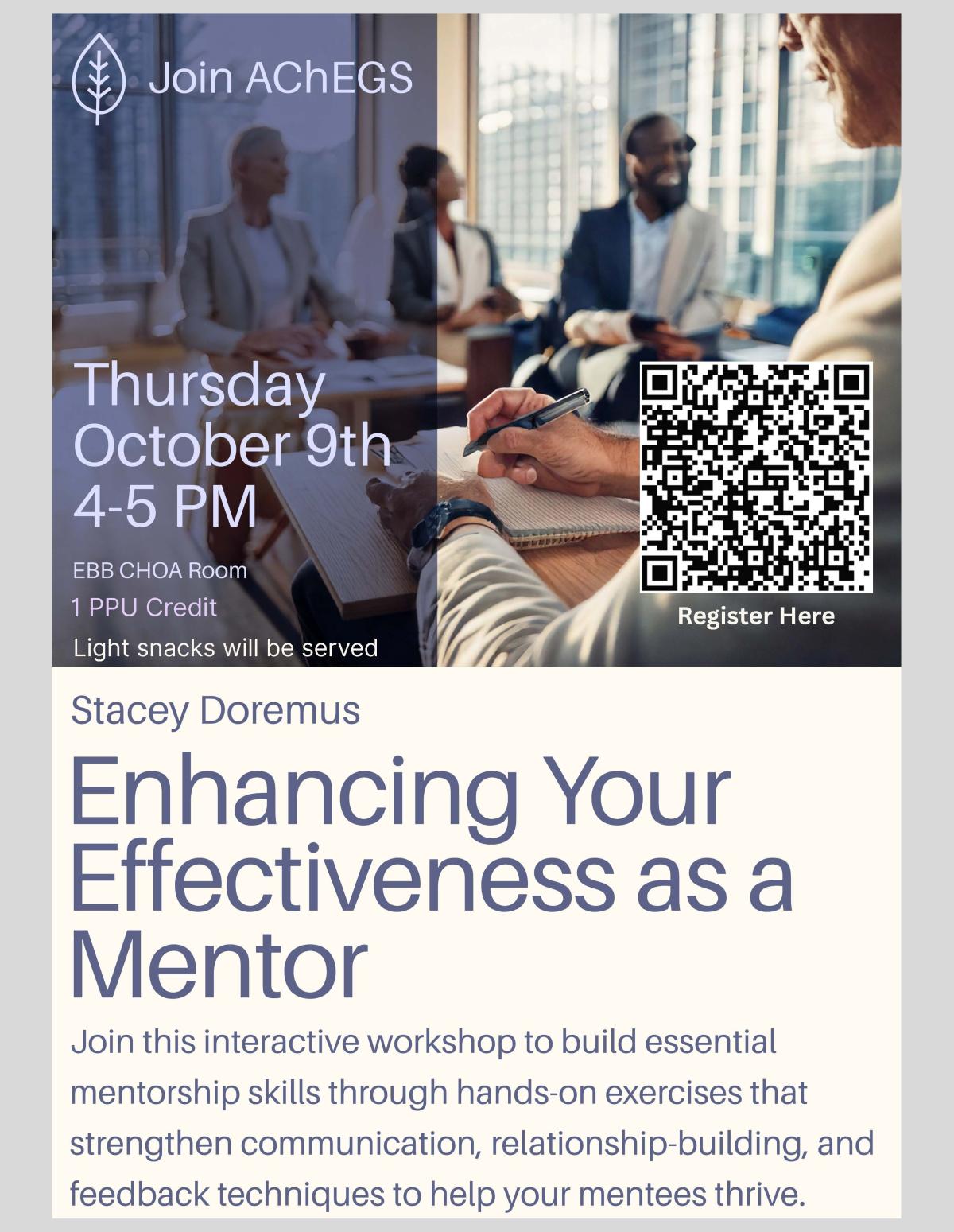
2. Conflict Resolution Workshop
Speaker: Kyla Ross
Date: Wednesday, October 15, 2025
Time: 10:00 a.m. to 12:00 p.m.
Venue: 102A&B Conference Room Pettit
PPU Credit: 1
Description: Dr. Kyla Turpin Ross, Assistant Vice Provost for Advocacy and Conflict Resolution speaks on common challenges experienced by graduate students on our campus. Learn how to productively navigate these conflicts that arise in research teams, graduate courses, and within graduate programs. Learn and practice strategies that help you and others move forward in difficult situations while preserving personal and professional relationships.
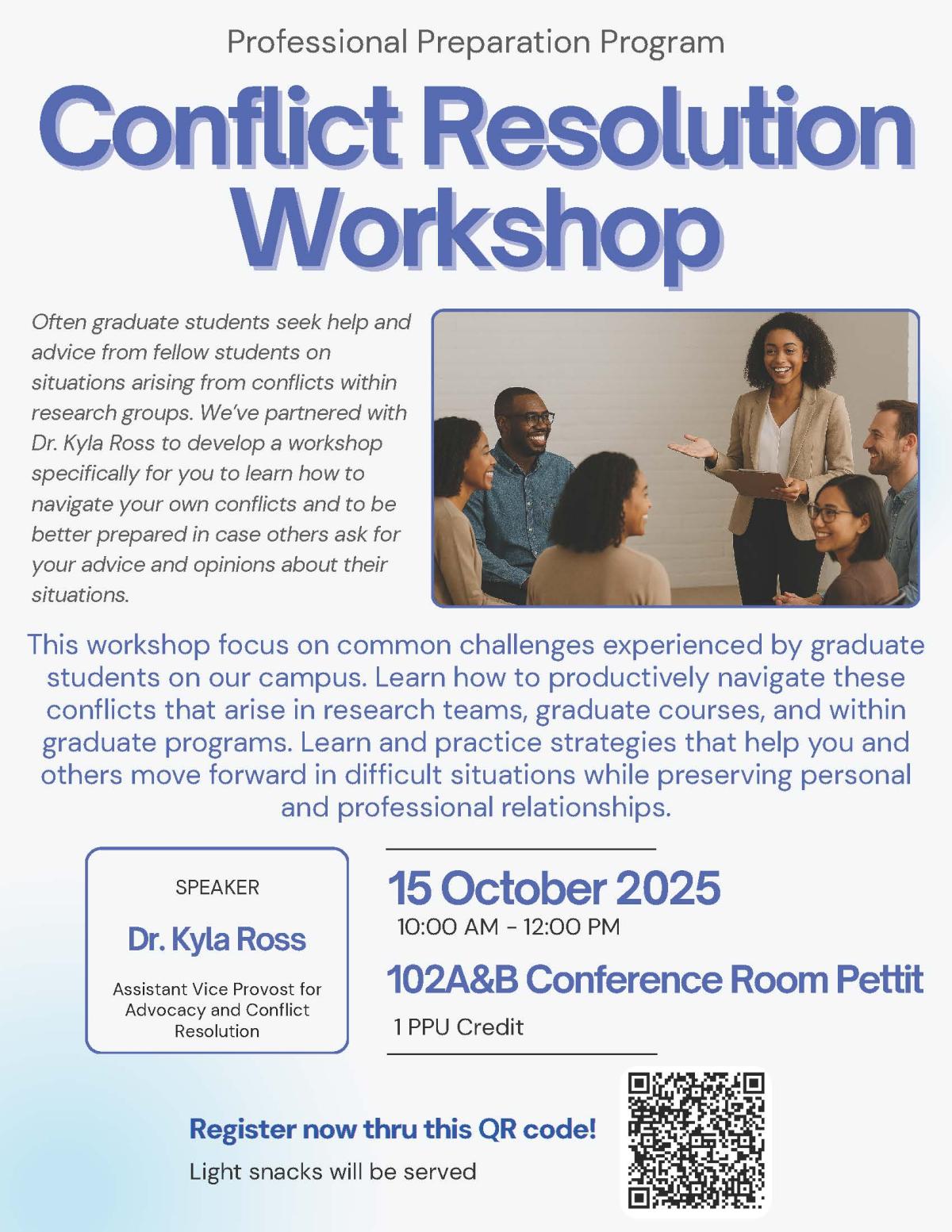
3. Workshop on Effective Technical Presentations
Speakers: Mark Prausnitz and Mark Styczynski
Session 1
Date: Friday, October 17, 2025
Time: 3:00 p.m. to 4:00 p.m.
Venue: Ford ES&T L1175
Session 2
Date: Friday, October 24, 2025
Time: 3:00 p.m. to 4:30 p.m.
Venue: Ford ES&T 1387 and L1120
PPU Credits: 3
Description: Technical presentations can be on dry and/or complex topics, but effectively communicating this technical content can be the difference between success and failure. This short course will provide guidance, heuristics, and practice for giving technical oral presentations that engage the audience and effectively communicate content. The first session will be a combination of lecture and very short impromptu "speeches" by some students. The second session will involve each student giving a presentation and helping critique the presentations of other students.
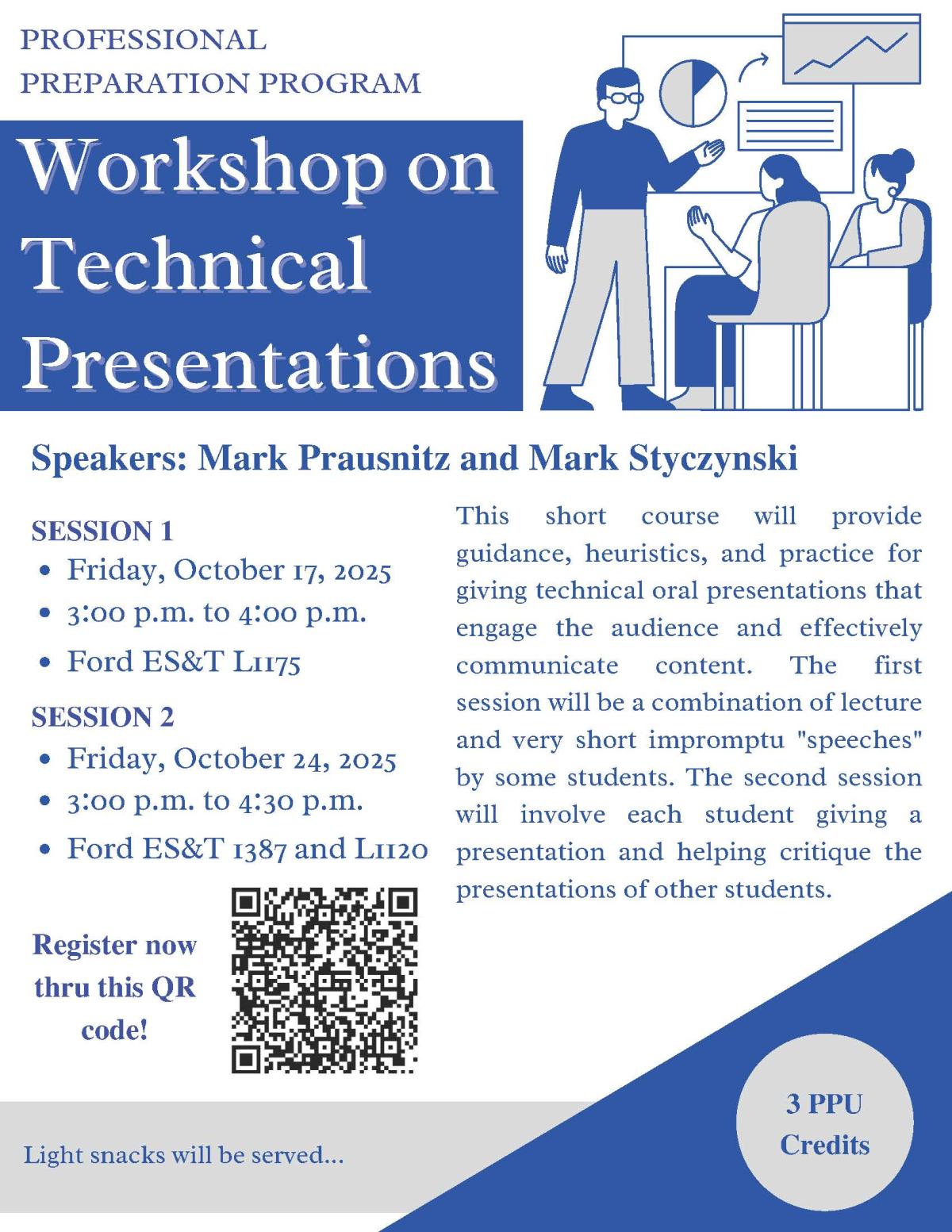
Workshop Descriptions
Below are the summaries of recently-offered Professional Preparation workshops, to provide a sense of the content and scope of these training efforts. Not all courses are offered every year, and some details are subject to changes.
Project Management for University Researchers
Instructor: Blair Brettmann
PPU awarded: 3
From a complex team project to a single experiment, clear-sighted planning and organizing can significantly improve the efficiency of research. This is particularly valuable in non-ideal research conditions, such as limited funding, restricted access to equipment and labs, and short-handed projects. Much of project management seems intuitive, but is challenging to implement without appropriate tools and structures. This interactive 2-part professional development course will teach the principles of project management and provide a number of tools that may be implemented in a research environment. The first part will cover how to define a project, prepare a project charter and identify appropriate tasks and resources. The second part will put your preparation into a specific plan using Project Libre project management software and provide tools for using your planning to execute the project. These skills will be beneficial for speeding up your research, particularly as we return from shelter-in-place to a more restricted environment. They will also be highly translatable to your future careers, whether in industry or academia.
Effective Technical Presentations
Instructor: Mark Prausnitz
PPU awarded: 3
Technical presentations can be on dry and/or complex topics, but effectively communicating this technical content can be the difference between success and failure. This short course will provide guidance, heuristics, and practice for giving technical oral presentations that engage the audience and effectively communicate content. The first session will be a combination of lecture and very short impromptu "speeches" by some students. The second session will involve each student giving a presentation and helping critique the presentations of other students.
The instructor, Prof. Prausnitz, has great experience in teaching about oral communications. He taught full-semester public speaking classes at Stanford, and has co-taught a ChBE technical communications class in previous years. He is also an extremely effective communicator of science.
Scientific Creativity
Instructors: Pete Ludovice and Lew Lefton
PPU awarded: 2
This workshop will leverage strategies from improvisational humor to encourage divergent thought, a valuable contributor to the creativity that is critical for scientific innovation. Creativity-encouraging exercises will be performed to explore new approaches to sampling "idea space," in an effort to inspire new science and engineering approaches that meet specified technical criteria and satisfy relevant physical laws. Workshop attendees will be equipped with skills and approaches to use moving forward that will help enable continuing scientific creativity.
Interactive Leadership Short Course for Engineers
Instructor: Dennis W. Hess
PPU awarded: 4
When engineers first undertake a leadership role, frustration is a frequent outcome. Such results are frequently due to a lack of "soft" or professional skills that are needed when technical and people problems intersect. This short course will describe the traits and mindset that are needed to lead technical teams, run effective meetings, and deal with conflict. After introduction of the necessary background, students will be divided into teams of 4 or 5 members and will discuss/debate methods of approaching specific problems that may be encountered by early- and mid-career engineers.
Mentoring conversations: Communicating and setting mutual expectations; and assessing, understanding, and fostering independence of your mentees
Instructors: Jana Stone and Kate Williams
PPU awarded: 3
If you are mentoring undergraduate students and/or if you are generally interested in becoming a good mentor now and in your future jobs, this is a great workshop for you. These sessions will give you a chance to learn, discuss, and practice strategies for navigating every day and challenging situations with your mentees so that you both can be successful.
The goal of our mentor training is to accelerate the process of becoming an effective research mentor by providing mentors with an intellectual framework, an opportunity to experiment with various methods, and a forum in which to solve mentoring dilemmas with the help of your peers. By the end of the training, mentors have a toolbox of strategies they can use when faced with difficult mentoring situations. Research mentor training—based upon the book Entering Mentoring—has been tested and shown to be effective in increasing mentoring knowledge, skills, and behavior.
NSF GRFP Workshop
Instructor: Jacqueline Mohalley-Snedeker
PPU awarded: 1
In this 45-minute workshop, Mohally-Snedeker will discuss the guidelines and best practices for applying for the fellowship and also give tips for writing the two required essays. We will also have a panel of ChBE students who have been awarded the fellowship in recent years – they will discuss the steps they took to be successful and will answer any questions you may have. If you are a 1st or 2nd year graduate student planning to apply for the NSF GRFP this year, you are enouraged to attend this workshop.
You Can Get There from Here: Guide to Writing your PhD Thesis Proposal
Instructor: Jacqueline Mohalley-Snedeker
PPU awarded: 3
For many engineers, writing can seem like a time-consuming and even confusing task. Yet, developing effective communication skills is a key success factor for engineers in both academia and industry. This two-part workshop will teach you principles of technical communication that will help you write an effective thesis proposal in an organized and efficient way. While the workshop is tailored to proposal writing, you’ll be able to use these techniques in other types of technical writing as well. The workshop will explain best practices for planning, organizing, and revising your proposal. We will also discuss excerpts from past proposals to illustrate effective writing techniques, and you’ll have a chance to practice those techniques. Finally, you’ll get a head start on your proposal by writing two key pieces of your proposal, and you’ll receive feedback on them from faculty and fellow students.